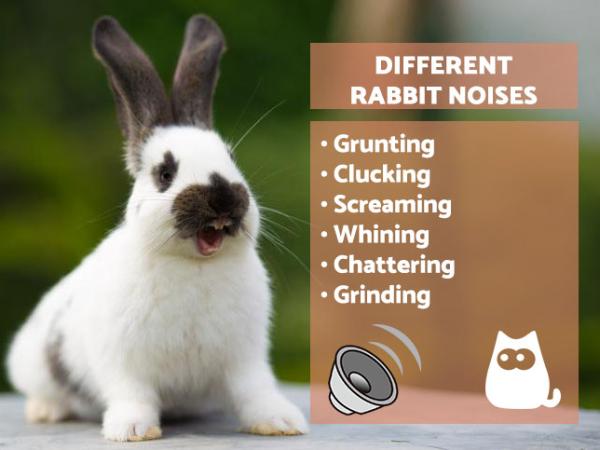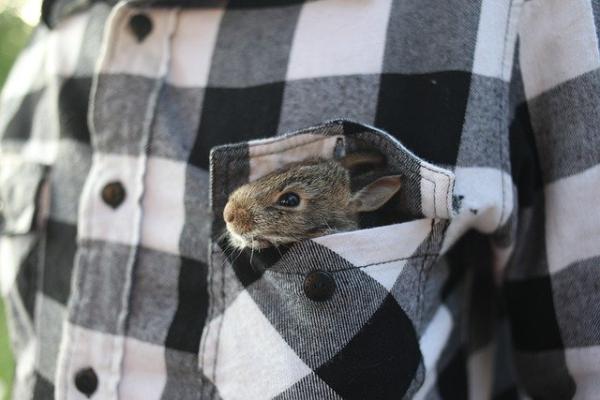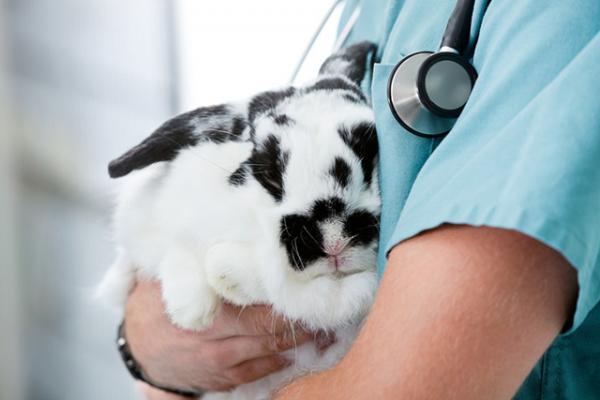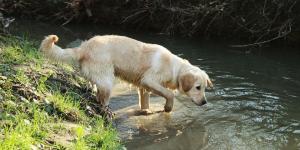Why is My Rabbit Making Noises?



See files for Rabbits
Rabbits are not an animal which stands out for being talkative. This is especially the case when we compare them with other companion animals such as cats and dogs. However, if you share your home with a rabbit, you will no they aren't exactly silent animals either. Rabbits do make sounds. Rabbit noises accompany many different activities and behaviors, often making weird noises which are difficult to interpret.
If you wonder why is your rabbit making noises, AnimalWised is here to help you. You may think your rabbit is making weird noises, but it is important to know that many of these situations are perfectly normal and healthy. Hopefully we can relieve any concerns by explain these different bunny noises and their meanings.
My rabbit makes noises when eating
When your rabbit makes noises when eating or chewing something, you shouldn't be alarmed. The most common reason for this rabbit sound is because they are ‘clucking’. Clucking is a sound rabbits make which sounds a little bit like a slight cackle or a contented grunt. They do it when they are eating and chewing something they like a lot. In particular it happens when they are eating something which requires a lot of chewing or if they gnaw on something.
If you want your rabbit to make happy clucking noises, you should know what are their favorite foods. You can find this out by looking at our article on fruit and vegetables recommended for rabbits.
My rabbit makes noises when sleeping
In the wild, rabbits are considered prey animals. They are small and do not generally attack other animals, preferring to evade predators rather than fight. Their best chances of survival are in a large part due to their ability to stay alert. For this reason, rabbits rarely sleep deeply. They need to be in a constant state of alert in case they need to react to danger in their environment.
For this reason, rabbits rest in a semi-wakeful sleep. Their brains will remain active and send signals to various body parts to stay alert. This may manifest in rapid breathing, limb movement, eye movement or even strange sounds, among others. Rabbits will often sleep with their eyes open. Although the total amount of time a rabbit sleeps decreases with age, they generally sleep for the same length of time when they do[1].
The sounds rabbits make when they sleep can very, but they often sound as if they are chewing, clucking or making ‘tutting’ sounds. The noises can even sound like they have a blocked nose, but their breathing should be normal. For more information, consult our article on how rabbits sleep.

My rabbit makes pig noises or grunts
Despite the fact rabbits have been domesticated, it is normal they may feel insecure if you pick them up in your arms. This could be due to a lack of trust or because you have not yet created a bond, but may also be due to wanting to be left alone in a given moment. Some rabbits may simply never want to be picked up.
Every time you pick up a rabbit, they may feel upset and scared. If they do, they will want to be left alone and placed back down. When they do this, they may make a whining or squealing sound. They may even try to bite you to make sure leave them alone, especially if they fear for their safety. The sounds they make when scared can sometimes be mistaken for grunts, similar to the sounds pigs make. If you have seen your rabbit screaming or biting you when you pick them up, it is likely to be due to fear. However, our article on why your rabbit bites you can also provide other reasons.
If your rabbit grunts or makes pig noises when you are close to them, it is likely they feel threatened. Another signal which shows the rabbit is frightened happens when they pee on you.
Rabbits are not generally aggressive animals. If they do become aggressive with people, it is most likely because they are scared. Rabbit aggression can also be directed at other rabbits, so we need to be careful when we hear rabbit noises if two or more rabbits are together.
My rabbit makes noise with their teeth
It is important to remember that not all rabbit noises are negative. While fear and aggression have accompanying sounds, rabbits will also make noises when they are happy and content. When you pick up or pet your rabbit and they are happy in your company, you may hear the sound of them gently grinding their teeth. If you pat their head, you may even notice them chattering.
Rabbits may be sensitive, but they are also companion animals for a reason. When you and your bunny have a healthy bond, they will often make contented noises when they are in your company. Looking out for the signs your rabbit loves you can help you to know if you are not sure.
My rabbit makes noises when running
It is not uncommon to see a rabbit making purring noises when running and jumping. In these cases, they are most likely simply happy to see you. We know this because a scared rabbit will likely make whining, screaming or grunting noises. You may also see the rabbit thumping the ground as a warning to you. In these latter cases, the rabbit is angry or scared, so it is best to leave them alone.
If you have a male and female rabbit which have not been sterilized, you should know they can emit a wide range of noises due to mating behavior. When a male has reached sexual maturity, they may chase a female to copulate. While rabbits do not go into heat the same as cats or dogs, they have their own mating practises which involve making excited noises. The male will also often make strange sounds when they are trying to court the female. These can manifest in honking or other noises.

My rabbit makes noises when breathing
While there is a wide range of noises healthy rabbits will make, we need to be observant for noises which imply there is something wrong with their health. One of the most common is when the rabbit is making labored breathing noises. If the rabbit is suffering from a pathology which negatively affects their respiration, they may make odd noises when breathing.
The main reason a rabbit makes labored breathing noises is due to blockage of mucus or there is inflammation. You may see the presence of mucus in the eyes or nose, but sometimes the sound is the only symptom we see. In these cases, we need to see a veterinarian to confirm a diagnosis and initiate treatment. If the rabbit is dying, there may be other signs such as not moving, self-isolation or appetite loss.
In general, if you are wondering why your rabbit is making noises, you need to look at the general context. When the rabbit is eating, with another rabbit or sleeping, we should learn when the rabbit noises are healthy and when not. If we are ever in doubt, take the rabbit to veterinarian.
If you want to read similar articles to Why is My Rabbit Making Noises?, we recommend you visit our Basic education category.
1. Thoman, E. B., et al. (1979). Ontogeny of sleep and wake states in the rabbit. Animal Behavior, 27(1), 95-106.
https://www.sciencedirect.com/science/article/abs/pii/0003347279901301
- Findlay, A. L. R., & Hayward, J. N. (1969). Spontaneous activity of single neurons in the hypothalamus of rabbits during sleep and waking. The Journal of Physiology, 201(1), 237-258.
- Olivero, R. (1998). Rabbit behavior. INIA Disclosure Sheet.
- Yllera F. M. M., Camiña G. M., Cantalapiedra A. J. (2016). Behavior and organs of the senses of animals . Monographs of Ibader - Livestock Series 2. Ibader. University of Santiago de Compostela. Lugo.







